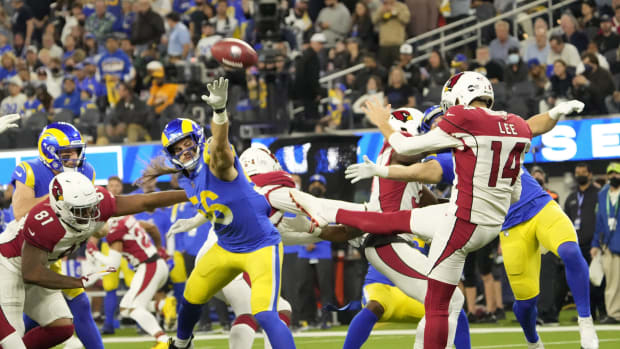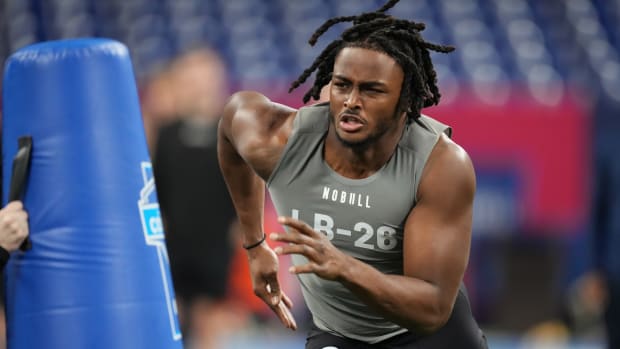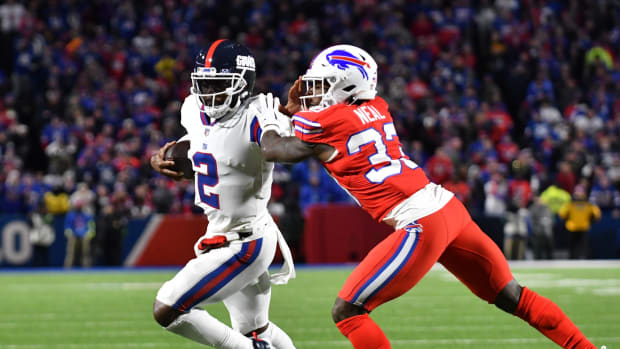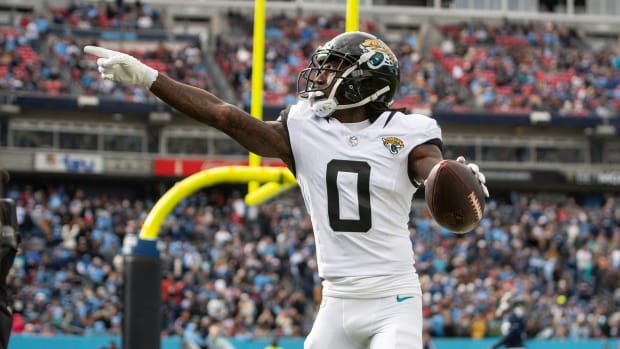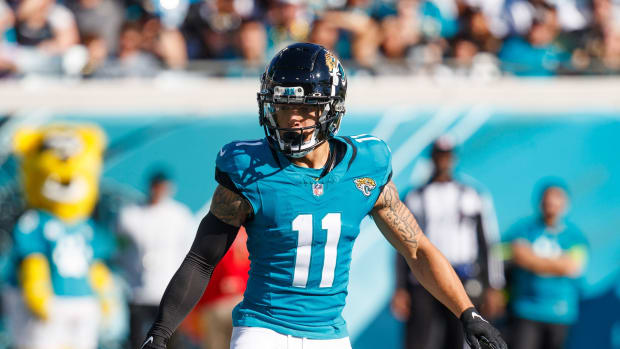Jay-Z Expresses Plan to Inspire Change, But NFL Partnership Met With Skepticism
On Wednesday afternoon, in a nondescript boardroom within Roc Nation’s Manhattan office, music legend Jay-Z sat beside NFL commissioner Roger Goodell at an oversized wooden table and officially announced their unusual partnership, while the specter of Colin Kaepernick loomed over the scene. The deal was supposed to be a surprise, the press conference to be the grand reveal. Reports of the collaboration, however, were leaked the day before—which may have ended up being a blessing in disguise, as it allowed both parties to prepare for the onslaught of pointed questions asked and skepticism leveled during the hour-long meeting with a small phalanx of the invited press.
During the first 15 minutes of the sit-down on Wednesday, details of the partnership were clarified, as they had been scarce. As a PowerPoint presentation was started on a wall-mounted screen, a spokesperson prepped the room for what was to come by saying, in typical grand NFL fashion: “This is bigger than music. This is bigger than sports. This is about unifying America.”
The deal introduces several new music and entertainment initiatives within the NFL that Jay-Z and Roc Nation will oversee. First, there is something they are calling Songs of the Season, where five artists, chosen by Roc Nation, will “create or provide an uplifting and motivating song to be used in NFL promos.” The songs will all be available on streaming services, and it will culminate at the Pro Bowl where all the artists will gather to perform. There is also a launch of content onto all music streaming services called Beyond the Field, which will “serve as the official NFL platform to work with artists, teams and players to curate the richness of football culture nationwide.” Examples that were given of what this might possibly entail were: Player and artist podcasts, official NFL playlists, archival footage and sideline audio. Then, of course, there is the Super Bowl halftime show, which Jay-Z and Roc Nation will now curate and co-produce; there will also be a live visual album of the performance released.
The other half of the partnership pertains to social justice—all of the proceeds from the visual album and from the Songs of the Season tracks will go towards the NFL’s already existing Inspire Change initiative, which was launched in January. Inspire Change is a joint venture between the players and the owners that focuses on supporting three areas, chosen by the players: educational and economic development, improving police and community relations and criminal justice reform. Each artist will be able to choose which program they’d like to support, and then will host a community event in a city of their choosing and will be featured in an Inspire Change documentary.
The partnership was hailed as peculiar because just eight months ago it was reported that Jay-Z was boycotting the halftime show in support of Kaepernick, the former Super Bowl quarterback who has been unable to find a job in the NFL for the past two years after inspiring the league’s social justice movement by taking a knee during the national anthem. Jay-Z had long been a prominent supporter of Kaepernick and wore a custom version of the quarterback’s jersey on Saturday Night Live in 2017.
When the news first broke about the partnership on Monday, Panthers safety Eric Reid, a close friend of Kaepernick’s, blasted the deal and tweeted that it was “disingenuous…to address social injustice while collectively blackballing Colin.” Reed also questioned the timing of the announcement, as it came on the heels of Dolphins owner Stephen Ross making headlines after he held a fundraiser for President Donald Trump, who has constantly peddled in racist rhetoric and referred to a generic kneeling NFL player as a “son of a bitch” in 2017.
On Wednesday—a day that marked the three-year anniversary of Kaepernick's first time protesting systematic oppression—the quarterback's presence loomed large over the room, as question after question pertained to the quarterback’s lack of involvement in the partnership and his current lack of employment in the NFL. There was warranted skepticism that this is more of a public relations play by the NFL, the possibility that using the imprimatur of a legend like Jay-Z was nothing but a palliative measure. By taking the reform movement off the field and moving it into behind-the-scenes channels, it could also be seen as an effort to make the protest less visible and more palatable to the masses.
Jay-Z, however, responded to every concern and every question with aplomb and thoughtfulness. He said he has had a conversation with Kaepernick about the partnership but wouldn’t detail what they discussed and said that he is not the quarterback’s “boss,” and can’t just bring him into the deal. “That’s for him to say,” the music mogul said. (Kaepernick’s girlfriend Nessa tweeted that “Colin never spoke to Jay-Z and NFL ahead of that deal being done).
When asked if he still supported the on-field protest, Jay-Z maintained that he still supports any and all protest that is “effective” and that he considers this partnership as a form of protest, as well. But he said, at this time, he’s “into action…into real work.” He reiterated again and again that his partnership was not replacing Kaepernick, but rather it is the next step of the movement that Kaepernick started.
“Colin’s whole thing was to bring attention to social injustice,” the rapper said. “This the next thing. For me, this is action. We help millions of millions of people or we get stuck on Colin not having a job.”
Jay-Z acknowledged that Kaepernick has also proved that he, too, is into taking action, through his Know Your Rights camp, a free youth campaign to raise awareness on education and how to properly engage with law enforcement, and his Million Dollar Pledge, which funded over 30 charitable organizations around the country. “That’s his version of an action item,” Jay-Z said. “This is our version.”
Their version came together, Goodell said on Wednesday, seven months ago when he flew to Los Angeles to meet with the rapper. Patriots owner Robert Kraft, who Jay-Z had a relationship with from their mutual work in prison reform, helped broker that meeting. The rapper immediately informed the commissioner that if this was simply about him performing at the Super Bowl, they could end the conversation then. He wanted something bigger, he wanted to use the platform that the NFL had to promote real change.
The rapper clarified on Wednesday that his issues with the Super Bowl were not actually about Kaepernick but rather pertained to the selection process, which he did not approve of. And he said that he told Travis Scott not to perform with Maroon 5 because, after Scott’s hugely successful record, he shouldn’t “play second fiddle to anyone that year.” Even with the new partnership, however, Jay-Z said he did not have plans to perform at the halftime show—at least not this coming year.
But on Wednesday the music and entertainment part of the deal was secondary to the social justice aspect, and rightfully so. While Goodell seemed to squirm whenever Kaepernick’s name was invoked—the commissioner did at one point say, “any team can sign him right now,” when asked if the quarterback was being blackballed—the commissioner did make an effort to show that his league wants to bring real change into communities. He repeated again and again that he has listened to the players and that he understood what they were saying, the issues they had brought to the forefront.
“I think what the players want is to focus on the world in the community and the problems we are addressing,” Goodell said. “They did the protest to bring attention to them. Now they want to get to the hard work.”
When asked if he wanted the on-field protests to stop, Goodell equivocated: “I want them to take what they are talking about and what they are protesting about and go make change in the communities,” he said. “That’s what they want. That’s what they were doing.” The commissioner was also asked what will happen the next time another player does in fact kneel for the anthem; he did not directly answer the question. “Let’s move forward and work to progress and let’s do things together,” he said. “If we need to shine a light on something, let’s do it together. That has been very effective for us.”
At one point during the conversation, Jay-Z was asked if he himself would kneel or stand for the anthem. “I think we have moved past kneeling,” he said. “I think it is time to go into actionable item ... I’m not minimizing [Kaepernick’s] part of it. That has to happen. That is a necessary part of the process. But now that we all know what’s going on, what are we going to do? How are we going to stop it?”
The tenor of the hour-long conversation was often tense, sometimes humorous—like when Jay-Z said, “I’m not the commissioner…yet.” Mostly, though, it was skeptical. At one point Goodell lamented that “the critics and the negativity overwhelm the chance to do something very positive.” But with the league’s history, it’s fair for onlookers to be a bit dubious about the sincerity of the league’s intentions driving the partnership. To his credit, however, Jay-Z came across as sincere in his desire to invoke and inspire change; his history of work in the community supports that his efforts here are genuine. And he said that he welcomes all of the reservations and the criticism.
“I want to be held accountable for what I am doing,” Jay-Z said. “It keeps me sharp. Lets me know I can’t play around. I have to do what I say I am going to do.”
Question or comment? Email us at talkback@themmqb.com.

































